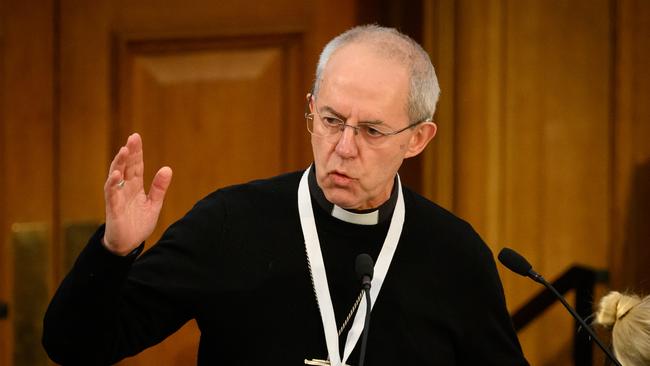Archbishop of Canterbury Justin Welby defies calls to resign over ‘prolific’ child abuser
The most senior cleric in the Anglican Church, the Archbishop of Canterbury, is rejecting pressure from critics to resign over his handling of a major abuse scandal.

The Archbishop of Canterbury says he will not resign over his handling of a major abuse scandal.
Three members of the Church of England’s general synod have started a petition, backed by several prominent priests, calling on Archbishop Justin Welby to resign after a report criticised the church for failing to stop John Smyth, a barrister who was the “most prolific serial abuser” in its history. He “brutally” beat 130 boys.
Last week Archbishop Welby said he had given serious thought to resigning after the report said that he had at least “some knowledge of the concerns” about Smyth in the early 1980s and showed a “distinct lack of curiosity” about allegations when they surfaced in 2013.
He apologised for failing to ensure that allegations were “energetically investigated” in 2013 but said he had known nothing about Smyth’s abuse before this.
The petition says: “With sadness we do not think there is any alternative to his immediate resignation if the process of change and healing is to start now.”
The Reverend Richard Coles, the radio presenter, said: “Anyone in authority who knew about an abuser and did not act properly so that abuse continued should resign. Then [we need] a reset that begins with making safeguarding in the CofE independent of the CofE.”
The Rev Giles Fraser, the vicar and columnist, said: “I think it seems increasingly unlikely that the Archbishop of Canterbury can survive in post, given the growing chorus of calls for his resignation from amongst his own clergy.”
Others have warned against treating Welby as a “scapegoat”, noting that some church officials knew much more than Archbishop Welby about Smyth’s abuse and covered it up. The petition says that a report by Keith Makin, a former director of social services, revealed “serious failures in the culture, structures, and leadership” of the church.
It also highlights Mr Makin’s finding that while Archbishop Welby did follow church protocol in ensuring that allegations were passed to the police in 2013, he failed in his “personal and moral responsibility” to ensure they were being robustly investigated. Smyth’s abuse continued until his death in 2018.
Archbishop Welby worked at Christian camps run by Smyth in the early 1980s. He told the review that in 1981 he had been told by a rector that Smyth was “really not a nice man”. Archbishop Welby said the warning was “vague” and left him with “no idea or suspicion” that Smyth was an abuser.
His victims included pupils at Winchester College, which did not tell police when it was informed of allegations but asked Smyth never to contact the boys or the school again. The Right Rev Andrew Watson, now the Bishop of Guildford, went to Winchester and said that he suffered “violent, excruciating and shocking” beatings.
The synod members behind the petition, the Rev Ian Paul, the Rev Marcus Walker and the Rev Robert Thompson are regular critics of Archbishop Welby. However, the Rev Canon Martha Mutikani said: “Surely we are Christian and forgiving is our responsibility.”
Andrew Graystone, an advocate for Smyth’s victims, said: “What is needed is not a scalp but a wholesale change of culture in the church.”
Lambeth Palace said that Archbishop Welby “reiterates his horror” at Smyth’s abuse and has “apologised profoundly both for his own failures and omissions and for the wickedness, concealment and abuse by the church more widely”.
The Times



